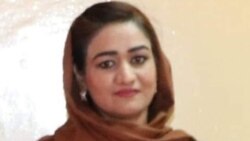Taliban authorities have confirmed the arrest of two men for their suspected role in the killings of four women, including a rights activist, whose bodies were found in a house last week in northern Afghanistan.
An interior ministry spokesman in Kabul Saturday said the detainees had confessed in preliminary interrogation to inviting the victims to the house in the northern city of Mazar-i-Sharif.
Qari Sayed Khosti did not say whether the suspects also admitted to the killings nor did he identify the victims or a motive. “Further investigations are underway and the case has been referred to court,” Khosti said in a video statement released via Twitter.
The slain activist was identified as Frozan Safi, a 29-year-old university lecturer in Mazar-i-Sharif. She had been desperate to leave the country after the Islamist Taliban took over Afghanistan in August, said Sayed Azim Sadat, director of the Zainuddin Mohammad Babar Cultural Center, where Safi worked.
Sadat told the Associated Press that Safi left her home about three weeks ago to meet someone who claimed he could facilitate her evacuation from Afghanistan. The other three women reportedly also had received a similar offer and were invited to the same house, only to later be found dead.
The Taliban’s return to power in Afghanistan after waging a 20-year insurgency against the former Western-backed government in Kabul and U.S.-led international forces have raised fears of human rights abuses and reprisals.
A United States-led Western emergency chaotic airlift enabled tens of thousands of people, including civil society activists and foreign nationals, to leave Afghanistan before the departure of American and NATO troops from the country at the end of August.
Taliban leaders have not blocked Afghans with valid passports and visas from leaving the country and repeatedly have reassured the global community they would protect the rights of all Afghans, including women and minorities, in line with Islamic laws.
But critics remain skeptical whether the Taliban will live up to their public pledges.
In a new report released this week, Human Rights Watch said Taliban-imposed limits on women working as aid workers are blocking the delivery of badly needed humanitarian assistance in much of Afghanistan.
In the majority of the country’s provinces, women aid workers are only able to work if they are accompanied by a male family member, the watchdog said. Only three of the country’s 34 provinces allow women aid workers to work unconditionally.
“The Taliban should immediately permit all aid workers, women and men, to fully do their jobs, or they will be placing even more people at risk,” said Heather Barr, associate women’s rights director at Human Rights Watch.
When the Islamist movement last held power from 1996 to 2001, women could not leave their homes unaccompanied, and girls could not receive an education.
The Taliban have reopened secondary schools for boys since taking power in August, but they have prevented most girls in Afghanistan from rejoining school — just like they did under the previous Taliban rule.
Taliban officials dismiss concerns they would not let girls receive an education, insisting relevant departments are making arrangements to enable girls to resume educational activities in “a safe and sound environment.”






